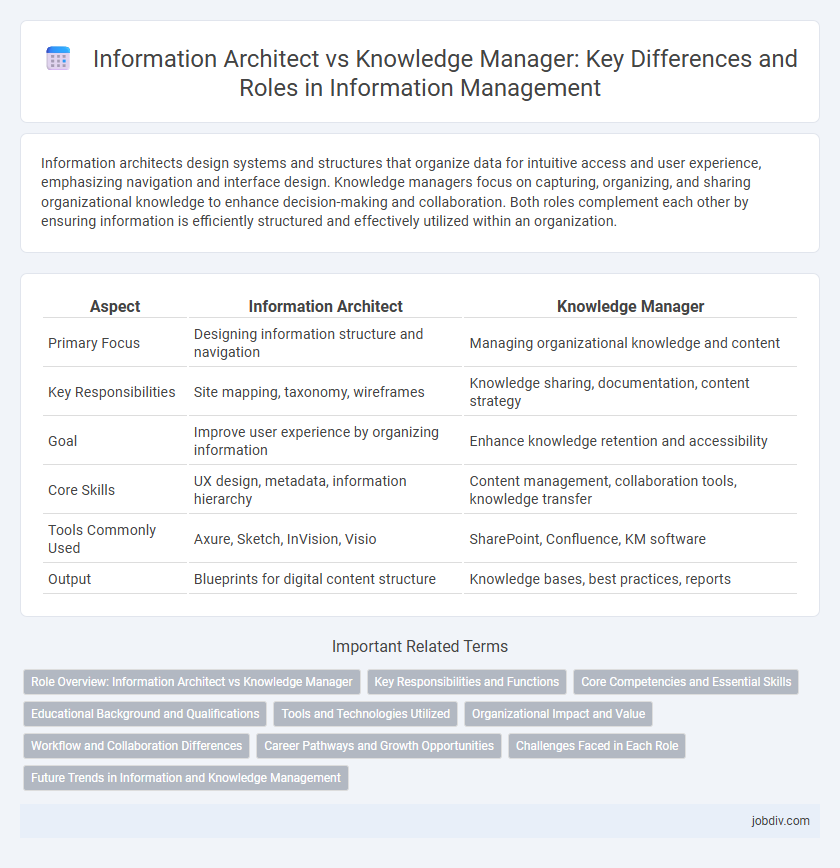Information architects design systems and structures that organize data for intuitive access and user experience, emphasizing navigation and interface design. Knowledge managers focus on capturing, organizing, and sharing organizational knowledge to enhance decision-making and collaboration. Both roles complement each other by ensuring information is efficiently structured and effectively utilized within an organization.
Table of Comparison
| Aspect | Information Architect | Knowledge Manager |
|---|---|---|
| Primary Focus | Designing information structure and navigation | Managing organizational knowledge and content |
| Key Responsibilities | Site mapping, taxonomy, wireframes | Knowledge sharing, documentation, content strategy |
| Goal | Improve user experience by organizing information | Enhance knowledge retention and accessibility |
| Core Skills | UX design, metadata, information hierarchy | Content management, collaboration tools, knowledge transfer |
| Tools Commonly Used | Axure, Sketch, InVision, Visio | SharePoint, Confluence, KM software |
| Output | Blueprints for digital content structure | Knowledge bases, best practices, reports |
Role Overview: Information Architect vs Knowledge Manager
Information Architects design and organize digital content structures to enhance user experience and ensure intuitive navigation across websites and applications. Knowledge Managers focus on capturing, distributing, and effectively utilizing organizational knowledge to improve decision-making and operational efficiency. Both roles optimize information flow but prioritize different facets: structural design versus knowledge lifecycle management.
Key Responsibilities and Functions
Information Architects design and structure digital environments to enhance user experience through effective navigation, content organization, and information flow. Knowledge Managers focus on capturing, distributing, and effectively utilizing organizational knowledge by implementing systems for knowledge sharing, collaboration, and retention. Both roles ensure optimal access to critical information, with Information Architects emphasizing usability and Knowledge Managers prioritizing knowledge lifecycle and organizational learning.
Core Competencies and Essential Skills
Information Architects excel in designing intuitive information structures, focusing on user experience, content organization, and navigation frameworks, leveraging skills in UX design, content strategy, and information modeling. Knowledge Managers specialize in capturing, organizing, and disseminating organizational knowledge, emphasizing expertise in knowledge sharing techniques, collaboration tools, and change management. Both roles require strong analytical abilities, effective communication, and a deep understanding of information systems, but Information Architects prioritize information accessibility while Knowledge Managers concentrate on knowledge retention and utilization.
Educational Background and Qualifications
Information Architects typically hold degrees in fields such as Information Science, Computer Science, or Human-Computer Interaction, emphasizing skills in user experience design, data structuring, and information systems. Knowledge Managers often possess educational backgrounds in Library Science, Business Administration, or Knowledge Management, combined with certifications like Certified Knowledge Manager (CKM) that focus on organizational learning, knowledge transfer, and content management. Both roles benefit from strong analytical capabilities and expertise in digital tools tailored to information organization and strategic knowledge sharing.
Tools and Technologies Utilized
Information Architects primarily utilize tools such as wireframing software, content management systems (CMS), and user experience (UX) design platforms to structure and organize digital content effectively. Knowledge Managers rely on technologies like knowledge bases, collaboration software, and enterprise social networks to capture, store, and share organizational knowledge. Both roles leverage analytics tools and artificial intelligence to enhance information accessibility and decision-making processes.
Organizational Impact and Value
Information architects design and structure information systems to enhance user experience and streamline data accessibility, directly influencing organizational efficiency and decision-making. Knowledge managers focus on capturing, sharing, and leveraging organizational knowledge to foster innovation and competitive advantage. Together, they maximize organizational impact by ensuring information is both well-organized and effectively utilized for strategic value.
Workflow and Collaboration Differences
Information Architects design workflows by structuring data and content to optimize user navigation and information retrieval, emphasizing clear taxonomy and metadata frameworks. Knowledge Managers prioritize collaborative processes that facilitate knowledge sharing, capture tacit expertise, and maintain organizational learning systems through platforms like intranets and knowledge bases. Workflow in Information Architecture centers on content accessibility, while Knowledge Management emphasizes social collaboration and cross-departmental knowledge exchange.
Career Pathways and Growth Opportunities
Information architects design and structure digital systems ensuring seamless user experiences, often advancing to senior UX roles or digital strategy positions. Knowledge managers focus on capturing, organizing, and sharing organizational knowledge, with career growth leading to chief knowledge officer or organizational development roles. Both career paths demand strong analytical and communication skills, offering opportunities in technology, consulting, and management sectors.
Challenges Faced in Each Role
Information Architects encounter challenges in structuring complex data to enhance user experience while ensuring scalability and consistency across digital platforms. Knowledge Managers struggle with capturing tacit knowledge, fostering organizational collaboration, and maintaining the accuracy and relevance of knowledge repositories. Both roles must address evolving technology integration and user behavior shifts to maintain effective information ecosystems.
Future Trends in Information and Knowledge Management
Future trends in Information and Knowledge Management emphasize the integration of artificial intelligence and machine learning to enhance data structuring and retrieval. Information Architects are increasingly focusing on designing adaptive, user-centric systems that facilitate seamless access to dynamic information landscapes. Knowledge Managers prioritize developing collaborative platforms that leverage real-time analytics and cognitive technologies to capture, share, and apply organizational knowledge effectively.
Information Architect vs Knowledge Manager Infographic

 jobdiv.com
jobdiv.com